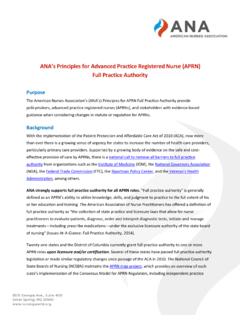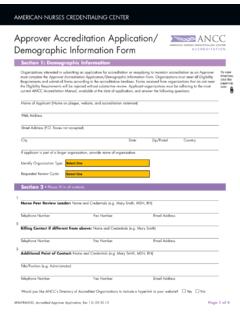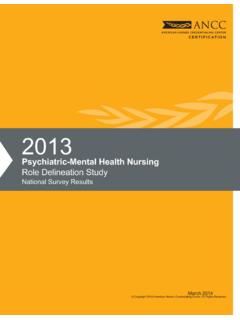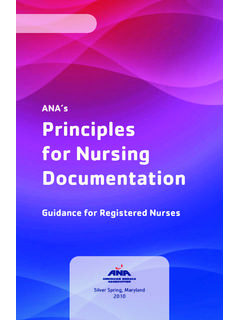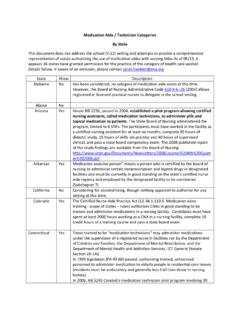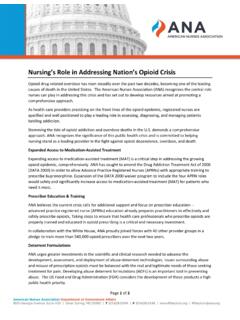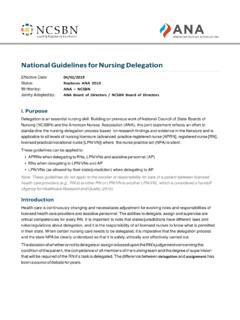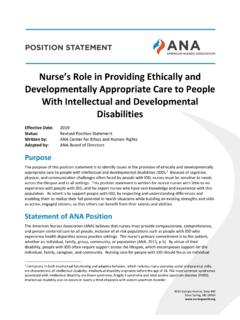Transcription of The Value of Nursing Care Coordination
1 June 2012 page 0 The Value of Nursing Care Coordination A WHITE PAPER OF THE american NURSES association June 2012 american Nurses association June 2012 page 1 The Value of Nursing Care Coordination : Executive Summary Why care Coordination and why now? Care Coordination has been proposed as a solution to many of the seemingly intractable problems of american health care: high costs, uneven quality, and too frequent disappointing patient outcomes. More resources are devoted to health care per capita in the United States than in any other nation, yet our fragmented system is often characterized by communication failures and non-beneficial or redundant healthcare tests and services.
2 This results in an unacceptable risk of error and an increase in cost, in terms of both resources and human suffering. Many independent elements of health care are high quality, but these need to be better aligned to serve patients and the people and institutions that care for them. Current financial and structural incentives restrict potential for better patient care outcomes and effective resource allocation. Rather, they intensify the weaknesses inherent in the non-coordinated, independently functioning pieces of our health care system. The development and implementation of effective systems and processes to cure this current misalignment can benefit tremendously from the experience, professional competencies, and long-standing ethos of registered Nursing .
3 Coordination of care is not a new idea, and it is certainly not new to registered nurses. In the context of a partnership guided by patients and families needs and preferences, the registered nurse is integral to patient satisfaction and care quality, as well as the efficient use of health care resources. Patient-centered care Coordination is a core professional standard and competency for all Nursing practice. Registered nurses understand that they are an essential component of the care Coordination process to improve patients care outcomes, facilitate effective inter-professional collaboration, and decrease costs across patient populations and health care settings.
4 What is well known to registered nurses, however, has not often been recognized outside of Nursing . This white paper was initiated to highlight both the qualitative and quantitative accomplishments of registered nurses in care Coordination . Care Coordination has been defined by numerous groups, many of which have focused on specific patient populations in specific settings. ANA has adopted the approaches of the National Quality Foundation and the Agency for Healthcare Research and Quality. Care Coordination is (a) a function that helps ensure that the patient s needs and preferences are met over time with respect to health services and information sharing across people, functions, and sites; and (b) the deliberate organization of patient care activities between two or more participants (including the patient) involved in a patient s care to facilitate the appropriate delivery of health care services.
5 Additionally, the best Coordination model is one in which a patient experiences primary care as RNs and APRNs have been performing care Coordination as a core part of the Nursing discipline since the turn of the last century. June 2012 page 2 delivered by an integrated, multidisciplinary team that explicitly includes at least one staff care coordinator. The Value of registered nurses in care Coordination roles has been demonstrated in numerous health care reform initiatives focused on integrative service delivery. Nurses design, implement, and participate in care Coordination projects and practices that seek to improve patient outcomes and decrease costs, frequently demonstrating the effectiveness of nurse -led and patient-centered care Coordination .
6 The focus of this white paper is on recent reports and studies that have documented results involving registered nurses in care Coordination . While the results derive from a wide variety of settings and diverse patient populations, the conclusions reached are strikingly similar. Authors observed the following: Reductions in emergency department visits Noticeable decreases in medication costs Reduced inpatient charges Reduced overall charges Average savings per patient Significant increases in survival with fewer readmissions Lower total annual Medicare costs for those beneficiaries participating in pilot projects compared to control groups Increased patient confidence in self-managing care Improved quality of care Increased safety of older adults during transition from an acute care setting to the home Improved clinical outcomes and reduced costs Improved patient satisfaction overall There is much more to be learned.
7 But the pattern of results to date is very suggestive and demands expanded research. RNs and advanced practice registered nurses (APRNs) can play substantial roles in care Coordination to improve the delivery of health care. Nurses are central to coordinating the patient experience, targeting both cost efficiencies and improved care outcomes for diverse patient groups. Different care settings, patients needs, and availability of resources may influence the selection of a care coordinator. For many patients, the registered nurse is the most appropriate care coordinator. In order to fully achieve this potential, clear models and outcome measures are needed to specify the context for care Coordination , identify Nursing competencies, and Value the nurse s role within the health care team.
8 To this end, ANA recommends that (a) more research be conducted to improve quality measures and the understanding of best practices of effective care Coordination ; (b) Different care settings, patients needs, and availability of resources may influence the selection of a care coordinator. For many patients, the registered nurse is the most appropriate care coordinator. June 2012 page 3 registered nurses education should be enhanced throughout their didactic and clinical learning experiences by incorporating care Coordination , including an emphasis on inter-professional, team-based care; and (c) Nursing organizations and nurse leaders should identify and implement care Coordination opportunities and nurse -led care Coordination models.
9 Further, care Coordination must be explained to patients (and families) so they will know how it may affect both their treatment and their participation in their treatment. ANA is deeply committed to improving the quality of outcomes for patients and providing greater health care efficiencies through care Coordination that is centered on the needs and preferences of patients and their families. ANA recognizes and promotes the integral role of registered nurses in the care Coordination process to improve patient care quality and outcomes, and to decrease costs across patient populations and health care settings. June 2012 page 4 Introduction Care Coordination is foundational to the health care reform goals of improving the quality of care for individuals and populations via the efficient and effective use of resources.
10 The increased complexity of care, growing numbers of patients with chronic disease, and exploding health care costs heighten the need for better integration of care without increased expenditures (Robinson, 2010). Very convincing evidence indicates that uncoordinated care greatly increases health care costs, but there is still a need to identify best practices and describe models and interventions that achieve patient-centered, high-quality care. Despite the challenges of measuring the cost effectiveness of care Coordination , addressing care gaps, and avoiding service duplication, there is consensus around the need for a designated health professional to provide patient/family-centered care Coordination (National Coalition on Care Coordination , 2010).

